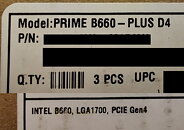
Intel B660 Motherboards May Lack PCIe 5.0 Support
The ASUS PRIME B660-PLUS D4 has allegedly been inadvertently sent instead of an ASUS Z690 motherboard to a reviewer for Alder Lake testing. The reviewer provided images of the product packaging to VideoCardz which clearly show a label indicating PCIe 4.0 support. This has come as a surprise as the Intel 12th Generation Alder Lake processors include attached PCIe 5.0 lanes separate from the chipset. The B660 chipset will target the mid-range market so the lack of PCIe 5.0 support on this specific motherboard may be a cost-cutting or artificial separation measure.
The first consumer PCIe 5.0 graphics cards and SSDs aren't expected to arrive until H1 2022 and will likely come at a significant premium so the exclusion of support could make sense for a more budget-oriented platform. Intel is also preparing to launch a higher-end H670 chipset which is expected to include PCIe 5.0 support. We cannot be sure if this label is accurate and if the lack of PCIe 5.0 support will apply to all B660 motherboards so take these rumors with a healthy dose of skepticism until the chipset and motherboards are officially unveiled.
The first consumer PCIe 5.0 graphics cards and SSDs aren't expected to arrive until H1 2022 and will likely come at a significant premium so the exclusion of support could make sense for a more budget-oriented platform. Intel is also preparing to launch a higher-end H670 chipset which is expected to include PCIe 5.0 support. We cannot be sure if this label is accurate and if the lack of PCIe 5.0 support will apply to all B660 motherboards so take these rumors with a healthy dose of skepticism until the chipset and motherboards are officially unveiled.


































































